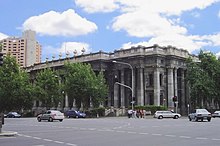Anangu Pitjantjatjara Yankunytjatjara Land Rights Act, 1981
| Anangu Pitjantjatjara Yankunytjatjara Land Rights Act 1981 | |
|---|---|
 |
|
| An Act to provide for the vesting of title to certain lands in the people known as Anangu Pitjantjatjara Yankunytjatjara; and for other purposes | |
| Enacted by | Parliament of South Australia |
| Date signed | 19 March 1981 |
| Introduced by | Tonkin Liberal Government |
| Amendments | |
| 1987, 2004, 2005, 2006 (x3) | |
| Related legislation | |
| Mining Act 1971, Petroleum Act 1949 | |
The Anangu Pitjantjatjara Yankunytjatjara Land Rights Act 1981 grants certain land and other rights to the Anangu Pitjantjatjara Yankunytjatjara (the people of the Pitjantjatjara and Yankunytjatjara dialects) in South Australia.
The Act began its life as the Pitjantjatjara Land Rights Act and commenced operation on 2 October 1981. Symbolically, the Act came into force on the one-year anniversary of the date when Premier David Tonkin and the Chairman of the Pitjantjatjara Council, Mr Kawaki Thompson, signed their agreement to the Pitjantjatjara Land Rights Bill.
The Hon Robert Lawson QC MLC provides the following history to the Act:
In 1976, an activist group, the Pitjantjatjara Council ('the Pit Council') was formed to lobby for land rights for the Pitjantjatjara people across South Australia, Western Australia and the Northern Territory. Premier Donald Dunstan established a Working Party to investigate the feasibility of a separate lands trust to cover the North-West Reserve.
'Helped by their solicitors', the Pit Council concluded that they should 'avoid imposing an alien notion like trusteeship': (Cocks, 66, 68). The solution was vesting title in a new entity of which all Pitjantjatjara people would be members. It appears that the aboriginal people had been convinced that they needed the 'fee simple' to their lands. They wanted something superior to the communal title arrangements which had been granted by the Fraser Government under the Aboriginal Land Rights (Northern Territory) Act 1976 (the 'NT Act').
In November 1978, Dunstan introduced a Bill which adopted most of the recommendations of the Working Party. In his second reading speech Dunstan did not disguise that he was seeking a wider audience than his Parliamentary colleagues and the indigenous people of the north-west.
A Parliamentary Committee investigated the merits of such a Bill, and reported in 1979 in favour of an Act that would give total rights to the Pitjantjatjara people over their traditional land in the northwest of South Australia.
Lawson continues:
...the provisions of this Bill will give South Australians an honourable place in international eyes with regard to the relation of Government to the treatment and status of ethnic minorities.
...
Wikipedia
